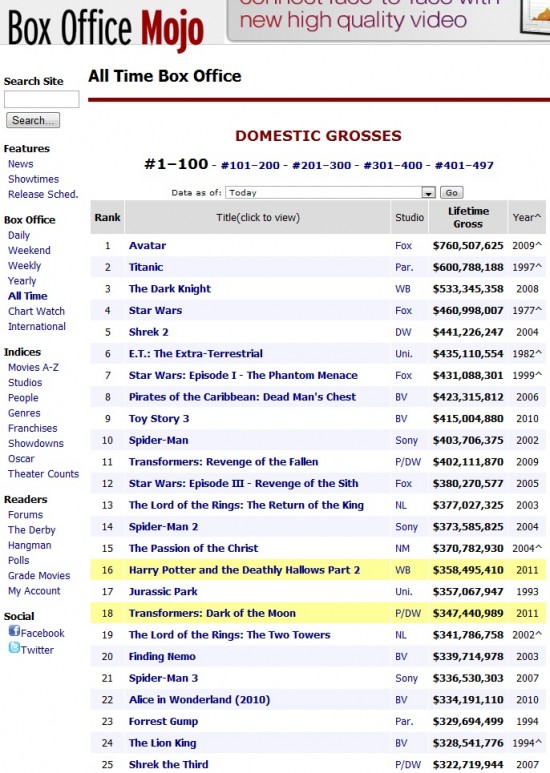Disney Exec Says Tentpole Movies Are About Spectacle, Not Story. Is He Right?
Think back to the last movie you paid to watch in theaters. What inspired you to shell out your hard-earned cash for two hours' entertainment when you could've easily saved money by exploring your Netflix queue at home? If you said "the story," Walt Disney Animation Studios chief technical officer Andy Hendrickson has one word for you: "Bullshit." In Hendrickson's view, what draws in paying audiences is "spectacle," not storytelling. And, well, he might not be totally wrong. Read more after the jump.
According to Hendrickson, the number of domestic tickets sold has remained steady since about 2005 even as the number of titled have increased — indicating that theatrical releases are drawing smaller and smaller audiences on average. Meanwhile, Hendrickson said, now that home video technology has moved on from more-profitable DVDs to less-profitable streaming, revenues from home entertainment have fallen to VHS-era levels. "Once you're out of theaters your maximum profit potential is over," Hendrickson said. Therefore, in his thinking, "Profit equals the ability to capture more than the average share of viewers [in theaters]."
There's no denying that a tentpole film, which Hendrickson describes as "one where you can seed the desire to see the film to everyone in every distribution channel," make lots of money for studios. What I, and I'm guessing most of you cinephiles reading /Film, have issues with is his assertion that story doesn't matter, only spectacle does. So let's take a look at some numbers. Here are the top 25 domestic grossers of all time, according to Box Office Mojo:
(This seems to be a different list from the one Hendrickson is said to have shown during his presentation, since according to Variety, Hendrickson's chart included Alice in Wonderland in the top 12; here, it ranks at #22. Nevertheless, it's probably safe to assume there was a hefty amount of overlap between the two.)
Going off of this chart, it looks like Hendrickson is right to place a high importance on visuals, at least from a financial standpoint. Avatar, Titanic, the Lord of the Rings series, the Spider-Man franchise, etc. — almost all the top films prominently feature spectacular visual effects. It's easy to guess why. Given the choice between paying to watch a big, flashy feast for the eyes that all your friends are talking about and paying an equal amount to see a small, obscure indie drama that'll probably look almost as good on your TV at home, most filmgoers (myself included) would probably opt for the former.
However, the chart also shows that plenty of high-grossing films also have a good story at heart. Okay, so no one walked into Transformers: Dark of the Moon expecting a moving tale, but it's hard to believe that "story" had nothing to do with the success of Titanic, E.T., or Finding Nemo. Star Wars (#4) is the kind of movie that fans saw not once, but two, three, fifteen times in theaters. Do you think the studio would've gotten those extra ticket sales if the film had been nothing but a two-hour special effects demonstration?
It's naive to pretend that "spectacle" has nothing to do with the success of a film, or that studios should be willing to suffer big financial losses in order to preserve their artistic integrity. At the end of the day, moviemaking is like any other industry — sure, people want to do good work, but they also want to make money. It's also worth nothing that as a studio exec, it's Hendrickson's job to focus on the business side of things.
All that said, it's equally silly to pretend, as Hendrickson does, that we need to choose between spectacle and story. Sure, Alice in Wonderland may have done well at the box office in spite of mediocre storytelling, but better storytelling could've turned it into a bona-fide classic. How much more would it have actually cost to toss in a few lines of character-building dialogue among all the effects-heavy sequences, anyway? The definition of a successful movie from a financial standpoint is one that draws in huge audiences and therefore rakes in lots of dough. While the top-grossing list admittedly contains a few critical duds, it seems like most of these films got where they did by offering audiences both dazzling spectacles and resonant storytelling.
And besides, I'd imagine you're probably more likely to convince people treat themselves to repeat viewings, double-dip on special edition DVDs and Blu-rays, or check out the inevitable remake if you're selling them a film they actually love.
Discuss: What do you think of Hendrickson's opinions on tentpoles and moviemaking?

